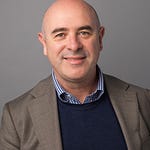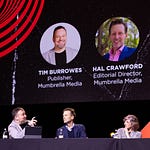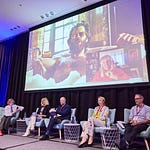Welcome to the Unmade podcast.
Today’s guest is Rod Prosser, chief sales officer at ViacomCBS, parent company of Network Ten.
In today’s conversation, Prosser reflects upon his turbulent decade at Ten, the difference on-demand viewing is making to the linear TV equation, and his bullish prediction for 2022 revenues.
And he also reveals that Pluto TV - the ViacomCBS-owned ad supported video streaming service - is just months away from an Australian launch.
You can listen to the Unmade podcast via the player in this post. Unmade is also now available on all the major podcast apps.
Transcript:
Tim Burrowes (00:04):
Welcome to the Unmade podcast. I'm Tim Burrowes. Well, we made it to the end of the official TV year. My guest today to talk about it is Rod Prosser, chief sales officer of ViacomCBS, who listeners will know best as the American based owner of Network 10. Welcome Rod.
Rod Prosser (00:24):
Hey Tim, how are you?
Tim Burrowes (00:25):
Mate, I'm very good. Thank you very much.
Rod Prosser (00:28):
Great. Great. Look, before we start, I'd just like to do a acknowledgement of the country if that's okay. I'd like to thank and acknowledge the traditional owners of the land, which I meet with you on today and pay my respects to the Elders, past and present.
Tim Burrowes (00:44):
Well, thank you for that and for doing the honours. Now I was looking on your LinkedIn profile. Next year, you'll mark a quarter of a century in media sales, almost all of it in television. Now that includes ten years with Nine, a couple of years in magazines with ACP, and a dozen years with Ten. I was thinking, you arrived just after CanWest had sold. Then there were a couple of years of relative stability on the ASX before things got a bit wild again when James Packer and Lachlan Murdoch invested. Grant Blackley was sacked as CEO a few months after you joined, James Warburton a couple of years after that, then there was the administration and being bought by CBS, which then merged with Viacom. Then COVID in 2020. Now, most people are going to look back on 2021 as an eventful year, but for you, I'm guessing it was kind of business as usual.
Rod Prosser (01:44):
It doesn't sound like there was a lot of stability, does it? Look, I think that COVID thing has been interesting. Certainly the journey Network 10 has been on over the last decade has been an interesting one and well documented. Look, I think my personal view is, is Ten has come out much stronger for all the changes and things that went through. But yeah, look, it's been an interesting ride and a really great one for me too, because of obviously through that period, as you just rightly pointed out, there's been obviously quite a number of various CEOs and leaders and I've been fortunate enough to work with them all and you learn good and bad from people. So I was really fortunate across the last decade with Ten and the number of changes that went through.
Tim Burrowes (02:36):
Well, one thing that interests me is now we've got this wider group. So we are two years into the merger or the re-merger, of Viacom and CBS. And it's starting to actually feel more like a group, even in Australia. You've got the former Viacom channels of MTV and Nickelodeon. Then in August we saw the launch of Paramount Plus. Do you wake up thinking still at heart you work for Ten, or do you actually feel like you're in a bigger group now?
Rod Prosser (03:07):
That's a really great question, Tim. The truth is we all wake up now feeling part of a bigger group because the integration that's happened over the course of, really, the last two years. With CBS, yes, we reported into the domestic business and that was fantastic. There was some great leaders in the business, and then obviously the Viacom CBS merge took place. That really defined, I think, us as part of being part of... We're of a global business, but a really strong connection into the international clusters. We are obviously falling into international, and our headquarters, if you like, is based in the UK. But within that cluster, there's Canada, there's Israel, there's obviously the UK and Australia. So we certainly get the sense that we're part of 1) a global business, but 2), as you rightly point out that the platform and the assets have really expanded. So we represent all the sales team represent all of our brands and assets on every platform. So we simply just can't wake up and think about Ten anymore. Otherwise, we'll be missing a trick or two.
Tim Burrowes (04:22):
Then I'm sure one of the challenges for you of course, is pretty much for the whole time that there's been this merged organisation or certainly the vast majority, you've been out in the office as well. So just having the opportunity to build a team culture must have been quite different.
Rod Prosser (04:38):
I think the culture part is really interesting, and I think that's something that not just our business, but most businesses would've struggled with over the last two years. We were quite fortunate in Australia that the vast majority of the team were already settled and part of Ten, I think the big emphasis that we needed to put on was really the newcomers that were coming into the broader business from Viacom. And indeed just more recently Paramount Plus. So I'm sure as soon as we're able and can get back into the office, there'll be a lot of social activity happening to really build that culture.
Tim Burrowes (05:21):
Let's talk about the programming year just gone. For you, what are the hits and highlights, and what are the ones where you think ‘We didn't quite get there on what we promised the market’?
Rod Prosser (05:38):
Yeah. Look, I'll start with how we're going to start next year, which is with I'm A Celebrity. That show has really redefined summer, as far as I'm concerned. For so many years, Tim, as you know, we were so heavily focused over that period just on sport and or with television, which was pretty bad when you look back at it now. We simply just dumped repeats across the summer period. As you know, we now work in a full year cycle. We don't just work to the ratings week. So we schedule for the full year. With having I'm A Celebrity there from the starting blocks and building that kind of momentum in the audience and creating a significant launch pad, for us, it's been such a terrific selling opportunity.
Tim Burrowes (06:36):
With Celebrity, obviously this year not being able to go overseas for it, did that make a difference, do you think?
Rod Prosser (06:44):
I actually, from our point of view, it's better from a commercial point of view, because obviously traveling product, locally or domestically, is a lot easier than getting it overseas. Now the programmers might think something different, but certainly from our point of view, it didn't impact the writings whatsoever. It was, as I said, a lot easier to integrate our sponsors.
Tim Burrowes (07:09):
Well, one of the ironies is last week is, I'm speaking to you from the UK, where there's the UK version of I'm A Celebrity which wasn't able to come to Australia to film and they lost four days of live programming to storms. So I guess one of the things Australia has is at least slightly more reliable weather.
Rod Prosser (07:29):
That's very true, and plenty of creepy crawlies that still build a lot of fear into the celebrities.
Tim Burrowes (07:39):
So. Okay. And going back to looking back at the year, so you are happy with the start to the year with I'm A Celebrity. How do you feel it unfolded from there?
Rod Prosser (07:51):
Look, the start was excellent, it always builds that momentum for us, as I said. Obviously we had some nuances in our schedule this year because of Covid. One of those being Survivor ran later than it would normally. Thankfully, because I think it gives us great momentum, even though the Amazing Race did amazing things, Survivor moving back into its home in post-Celebrity, the right place.
Tim Burrowes (08:19):
Yeah. Because you were hoping for two seasons, weren't you of Survivor, initially?
Rod Prosser (08:23):
Yeah. I think we sort of decided that, but well look, we often ran two in a year, I think this year we went back to... We could only do one, so we only ever scheduled the one, but it had to run later just because of timing and Covid and we had to obviously pivot it originally. Traditionally we shoot it in Fiji. Obviously it was then housed in Queensland and will be again. So we do have to pivot, so yes, we may have had thoughts around how could we run too, but I think the idea is always just to have one series running a year, because it's a heavy production. So having that back into its original slot, if you like, is going to continue that momentum straight into mastership. So I think as you look at the highs and the lows, there's probably some key franchises that we're disappointing. But having said that, I think that in terms of numbers, having said that commercially all of our big Ten poll programs have been a success.
Rod Prosser (09:26):
I think that any franchise kind of gets to a point where it needs to have be somewhat reinvented. I think certainly the programmers are looking at what franchises need that sort of freshening up. The other thing that we were challenged with this year was various lockdowns. I think all networks suffered slightly from people being... Well, actually gained some upside with people being locked into their house, obviously, but obviously when freedom was given to people, they were out and about. So we did have some impacts around timing, some of our franchises. So it's probably not fair to look at the pure thousands as success or not success because it really was quite an unusual year.
Tim Burrowes (10:11):
Maybe when we talk about sort of a series which certainly were perceived to underperform in numbers, we might find ourselves talking about The Bachelorette. Before we do, in context, what I found really interesting about Ten this year was, if I think back about its various presentations to the market, it gave a great deal of thought to how it positioned itself. There were two messages I was left with. One was Under-50s and the ironically disputed word “undisputed”. And the other thing was the message about being the most progressive of the commercial networks when it came to things like being the... I'm pretty sure the first network to do a Welcome to Country before the U pfront, for instance.
Tim Burrowes (10:59):
So I suppose when we think about The Bachelorette, the first bisexual competitor, for instance, it clearly played a bigger role within the position of where the network wants to be seen, and where it wants to be seen in the national conversation. How did you feel about the numbers? I guess my question really is, are you taking middle Australia with you, or are you slightly too far ahead of them at the moment, do you think?
Rod Prosser (11:35):
Look, regardless whether we're slightly ahead of them, I think you've got to take a stance. Our business really is a value driven business, both locally and globally, and we just continue to strive to do better and make positive changes in the world we live in. We're acutely aware that we have a platform and a voice that reaches globally over four, 4.5 billion, but obviously locally you know our numbers... And that comes with a responsibility. It's our job to raise the bar, not lower the conversation. I think that we will continue to make sure that we have a diverse representation onscreen and behind screen. To be honest with you, The Bachelorette, we were super proud of. I know the brands that leant in and sponsors were equally proud of it because of what it stood for.
Rod Prosser (12:29):
I think that we need to have, the measurement is, and the thousands is one part, but then there needs to be, which I keep pulling out to the industry, we need to have another measurement. And that simply has to be: what's the diversity on screen? You make a good call because it is a fine balance, but ultimately if it's good TV and it represents all of this country and all the different faces and all the different genders, then you should have a winning model. So I'm sure and confident that we'll continue to be able to deliver that and continue to be able to find an audience that follow it.
Tim Burrowes (13:17):
One of the other questions, for television on any network at the moment is, we're seeing overnight broadcast numbers go down. There's no doubt about that. This year, for the TV industry as a whole, and of course this was also the year that VOZ launched, which gives us a sort of wider picture. How does that affect the conversation that you have with the advertisers and the media agencies? Is it as easy to monetise catch up viewing as it is broadcast viewing? Or is there still some progress to go on that too?
Rod Prosser (13:59):
Look, there's a lot of demand in catch-up. I would say that. So we call it on demand, not catch-up anymore. So with our BVOD product, the market is quite hot and we'll continue to see significant growth. The question I think you're asking is can we make up the revenue on the BVOD as we have declining audiences on linear? The answer to that is yes. We will be able to, and of course live TV is enabling us to monetise even further, but that's why the whole ecosystem's really important for us. We call it our playground, but how we push and pull the audience around our playground, if you like, is really critical.
Rod Prosser (14:49):
Of course, Paramount Plus plays into that. We will soon launch another AVOD service in this market. Obviously we've got a fairly significant AVOD service being Pluto TV that's being rolled out globally, and that will equally play into it. So I think it's actually about how do you sort of manage both linear and digital together? At some point, the digital revenue will outgrow the linear, but at this point it really is, Tim I hate to use this term, but it's the meat and potatoes and drives the biggest part of our revenue. So it's super important to us. We'll continue investing in the linear. You'll continue to see high quality good content being produced for the linear screen, but equally next year we'll grow our library on 10play. So there's a lot of investment going in there as well.
Tim Burrowes (15:42):
For people who aren't familiar with Pluto, which you just referred to, that's been a real phenomenon out in the US, hasn't it? So that effectively, as I suppose - tell me if I'm understanding it wrongly - but I'd see it almost as a sister service to Paramount Plus, but of course advertising supported, but quite a deep library, and it's been driving some quite big audience numbers. So we'll see that in 2022 here in Australia then, will we?
Rod Prosser (16:12):
Look, I'm probably letting the cat out of the bag a little bit here, but I'm not quite sure of the exact launch date, but one thing I can tell you is it's coming and it won't be too far off. We're not talking years off. So, obviously we've got to get other things ready and right. But it's certainly on its way to Australia at some point.
Tim Burrowes (16:35):
And that in much the same way that we saw 10 All Access become Paramount Plus presumably we'd see 10play become Pluto, would we? Or would it sit alongside the two?
Rod Prosser (16:50):
I'm not sure that's right, Tim. I think these are the new nuances and the structure that we need to look at, what's going to be best to serve our audiences and of course our advertising partners. So we haven't landed that yet, still a lot of work to do, but I can't see how they would merge, but at this point, look, we're really enthusiastic about the 10play product. So we, as I said, we'll continue to invest and grow that library to grow the overall minutes.
Tim Burrowes (17:21):
Now, something you touched on about the importance of live TV of course is arguably the two staples of live TV are sport and news. Arguably, if I had to pick the three sales directors, you've got the toughest job because you've got the least sport and arguably the least news resource as well. Is that a fair observation?
Rod Prosser (17:45):
I love being an underdog, Tim. It's the way we roll. Look, I don't see it that way. I mean, I'm sure others might, but I don't see it that way. I see we have such a huge opportunity with football, otherwise known as soccer in this country, but we're now the home of football and we position ourselves that way. We'll continue to grow that sport. Look, we always went into football knowing that it was such a huge opportunity to grow the sport. It meant a lot to us in terms of how that positions, it's really inclusive, it's diverse, it certainly stood for a lot of the things that we stood for, so it made a lot of sense. And of course it's a global game.
Rod Prosser (18:34):
So when we talk to our counterparts within the business, they understand the game. So it was really kind of a no brainer, but look, the opportunity for us is: it is the highest participated sport in this country. We turned that participation into viewers and they we’re into winning gold. So, I think that's the opportunity. I wouldn't say that we’ve got the toughest job. We've had commercial partners come out of the wood works and wanted to support it and be a part of it. So we're enthusiastic about that. Obviously we've got some marquee events which are marquee events, but we've got the AGP, Australian Grand Prix, and indeed Spring Carnival week, which we've just, not too long ago rolled out of, which are huge ratings and money drivers for the business. Also, a lot of fun to attend.
Tim Burrowes (19:31):
With A League, I presume something like that takes a year or two to really get all of the sponsors aligned. So presumably these few months, we are not really seeing everything you'd hope to see yet in terms of support.
Rod Prosser (19:45):
Well, look, I think from sponsors, we've got the commitments and the categories that we were chasing. So I'm really pleased with where we've landed and we've actually exceeded expectations commercially. The journey now we have is to really get Australians aware that it's actually being broadcast and where it's being broadcast, obviously a lot of the games are on Paramount Plus. That's a really good subs driver for us, but equally we want to make it available to all Australians. So there's games on 10play. Of course, there's games on Ten as well. So we always knew it was a building journey with this sport, but we've been really encouraged with both A-League's ratings and of course the international games, they dominated the demos and have performed really well for us. But yeah, it's a long partnership. We've got five years, we've taken equity within the APL. So we're behind it 100%.
Tim Burrowes (20:53):
Well before we start looking forward to next year, a couple other bits of housekeeping. It seems like a million years ago, but I remember we were talking about how there was a plan to bring James Corden to Australia, your upfronts friend, James Corden who had done the opening video with him. Is that back on the agenda for next year, are you likely to get him out in 2022, do you think?
Rod Prosser (21:20):
We'd love to get him out, and I know James would love to come out. It's a logistic thing more than anything, obviously Covid has created the headache for us that made it not possible when we wanted to, but we are always talking to the guys at CBS on how we can make that possible. We haven't, obviously we haven't slated a date, but we'll continue to talk to him and find a way soon hopefully, Tim.
Tim Burrowes (21:45):
Well, yeah, let's talk about next year. One of the things which certainly makes life interesting for me to write about is it feels that of the three networks, Ten is the one which has got the most new formats coming through. Which is from your point of view, I suppose, both interesting and an element of risk because you haven't got the familiarity factor of an existing format just rolling out again. How are you thinking about the coming year? What sort of promises are you making to sponsors about audiences for some of the new shows?
Rod Prosser (22:17):
Yeah, I mean, we've spent a lot of time with our agency partners, our consortiums, as we call them. Indeed, our incumbent sponsors around where we're going to see the audience growth next year. We have growth built into our schedule, no question. We think a lot of things will be normalized next year, particularly as hopefully we roll into what will be a much more normal year, less impact from Covid. So we know that there's pockets and areas where we needed to focus on. I'll take Master Chef as an example. Obviously, that was in a very different position last year. Everyone was in their homes and the ratings went through the roof, great new format in terms of the way we positioned it, where all the ex-contestants came back. Indeed, we launched out our new judges, which we were so pleased we had such a fresh looking show.
Rod Prosser (23:17):
Then this year, obviously, as I said, nuanced because of lockdowns, et cetera, but we also knew that we needed to have a stronger hook. So next year we go into Master Chef with a lot of the ex-contestants, including Julie Goodwin returning to really challenge it out in the kitchen. So we know that we've got a lot of enthusiastic partners already wanting to come onboard and we know there's going to be growth in the thousands on that. So, that's a great example of about how we can tweak a format to really lift the audience. Then of course, as we get into the second half, and actually to be honest with you, our thousands in our ratings right in this period now have grown. So we're pleased about that. Look, the commitments we've made to our agencies in consortiums is around growth, and indeed both audience growth and commercial share growth. We are pretty confident around doing that.
Tim Burrowes (24:20):
I guess in terms of investment in new formats, Hunted would be the biggest one.
Rod Prosser (24:24):
Yeah. Look, firstly, I think it's really important that we keep delivering new formats. The audience, our audience craves for that. We talk about a progressive audience just rolling out a consistent schedule is great, but you also need to pepper that with new formats and something fresh, and our audience expects that from us. So, even if that's a show that sits at 8:30 at night, or if it's a big franchise, their expectation is that we'll deliver something fresh. Hunted is a great format that's worked overseas that we're really confident that will do great things out here. It's going to be shot in Melbourne, it's really fresh, it's really different and it's like nothing else that's on the TV screens at the minute.
Tim Burrowes (25:17):
What sort of age demographic do you think it will be attractive to?
Rod Prosser (25:20):
Well, again, acquisition models always around the Under-50s, and look, the bullseye will be 25-54. I mean, I think that's the interesting thing if you look at our schedule, Tim, from really from that 6:00 PM to 10:30, we have the highest concentration of 25-54s. Actually, most of the demos, we have 45% of our audience of half of our audience let’s call it, sitting within the 25-54 demo over that time slot. Which is vastly different to our competitors, which some skew much older. Whereas, over 65s, we have such a small percentage within that time slot. So, Hunted and all our new formats are always targeted in the demos, they'll never skew old. I don't think we'd never get the older audiences anyway, even when we play Dancing with the Stars, which just does skew very old, we still had a much younger medium-age across that format.
Tim Burrowes (26:29):
I think if I remember rightly, I think you did even better again, proportionally, in 16-39 than 25-54, didn't you? I guess I always wonder why you don't just lean into that one a bit more.
Rod Prosser (26:44):
Yeah. Look, I think that's a really interesting demo. Of course yes, you're right, we do fare better. In fact, we kind of see it's around eight of the top 15, in 16-39s are on Ten. Look, the truth is, is that demographic is consuming content across a whole heap of platforms. We see a big surge, particularly in our on demand services of that demo. Of course in SVOD. Yes, you're right. Indeed, we do lean into it. It's around how do we capture them across all of our platforms to kind of pull them across the broader Ten, ViacomCBS assets.
Tim Burrowes (27:30):
Just to put this year's “undisputed” under-50s claim to bear. I get the sense you are explaining what you mean in a slightly different way now. Do you think, on reflection, maybe when you first went to the market with the “undisputed” under-50s network, you maybe went a little bit too far, do you think?
Rod Prosser (27:52):
No, I don't. I think we've always made it really clear that we have a higher percentage of the under-50s. I think it's amusing that we've been criticised around that because on one hand everyone's talking around hyper-targeting and they want less wastage. Then on the other hand, they're saying, "Oh, but a total people audience is the right one to look at." Buyers don't buy it like that, you know that Tim. They buy demographics and they target demographics. If we can deliver them efficiently without wastage, then in my mind, we are undisputed within those demos and within that demographic.
Tim Burrowes (28:36):
I did get a bit of a sense this year that maybe the different networks weren't quite as good at speaking with one voice about television. We saw, James Warburton from Seven came out and talked a bit about how the industry as a whole should be talking about overnight ratings, versus later ones, and there was some debate there. Again, everyone seems to make slightly different claims about their tech stacks. Again, some different arguments about which metrics really count when it comes to on demand viewing. Do you think the TV industry can get back to speaking with one voice again?
Rod Prosser (29:20):
Yes, I do. I think, look, it's in our best interest. I have to say behind the scenes there's a lot of cohesive discussions going on, whether that's through ThinkTV or whether that's through OzTam on how we best position ourselves as an industry. So there is a lot of work being done on how we unite and come together. I honestly have a lot of faith in the industry. It's like no other medium. It reaches more Australians every day than any other medium. As the measurement evolves, we just need to get super aligned, and that work's being done now. We've obviously got a new chair sitting on OzTam who's really enthusiastic, Mark Buckman, around bringing the team together. So I have no doubts that we will land a position, which is a united front.
Tim Burrowes (30:21):
Well, again, I suppose I think about you and the difference between you and your two competitors, which is, they're on an Australian financial year and you owned by a US company, which has a calendar financial year. So I guess you’ll have just locked in your 2022 budget. Thing about being in your role is you have to make some promises that you think you can keep. So have you promised your bosses a return to 2019 revenue levels?
Rod Prosser (30:49):
Actually, I mean, be honest with you Tim, our revenue expectations are higher than 2019. We've been really fortunate commercially to grow our revenue share and our overall revenue across the last two years. So I'm really pleased with the sales team. I think part of that is that we sort of don't look behind us. We don't spend a lot of time worrying about what you call our competitors are doing, whether it's Seven and Nine. The sales team are singularly focused on what they can deliver and they're ideas-centric. So that's really resonated with the market, and off the back of that, we've been really successful, as I said, at growing our revenue and our revenue share, but also our premium, what we can offer advertisers in terms of our integration and sponsorship, partnership elements, is been really well received. So our expectation and the company's expectation is greater than that of what we delivered in 2019.
Tim Burrowes (32:00):
Big promise. That is where we leave it. My thanks to Rod Prosser. If it's not too early to say it, have a great Christmas break, Rod.
Rod Prosser (32:08):
You too Tim. It was wonderful chatting to you today. Yes, have a very Merry Christmas.
Tim Burrowes (32:14):
The Unmade podcast is produced with the enthusiastic support of Abe's Audio. More soon. I'm Tim Burrowes. Toodlepip.














Share this post